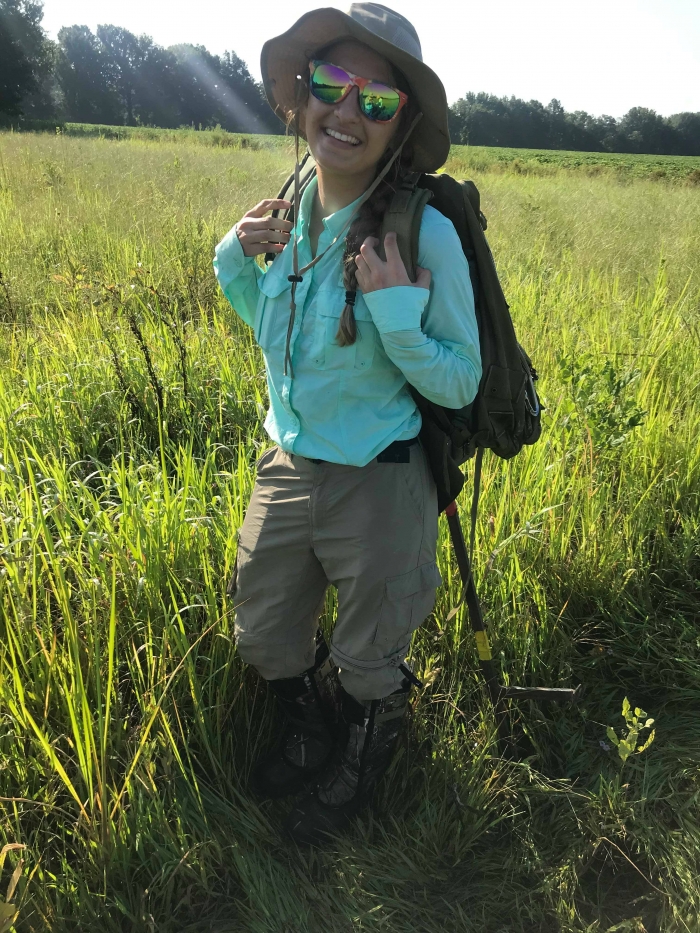SOAR Student Profiles

Kylie Moe
- SOAR Position: Member; Alumni
- Major: Biology
- Faculty Mentor(s): Dr. Donald Walker
Current Focus: The endosymbiotic bacterial community of the causative agent of White-Nose Syndrome (Pseudogymnoascus destructans) of bats.
Additional Interests: Snake Fungal Disease, restoration ecology, conservation
Project Description
I have been working with Ashton Reece, a graduate student in Dr. Donald Walker's lab, since 2018 regarding bacterial communities and the impact they have on the virulence of Pseudogymnoascus destructans (Pd), the fungus that causes White-Nose Syndrome in bats. White-Nose Syndrome is a fungal disease introduced to the US from Europe in 2006. It is currently spreading across the US, decimating local bat populations. This disease causes bats to wake up during hibernation using essential fat reserves and experience various physiological effects. The loss of these reserves causes bats to be unable to sustain themselves through the hibernation period, leading to death. We hope by identifying bacterial relationships associated with Pd, we can have a better understanding of biological applications to counteract the adverse effects of this disease. Using high-throughput sequencing and transmission electron microscopy (TEM) we have identified Nocardia spp. as a potential symbiont of Pd. We are currently analyzing data from multiple enzymatic assays, which we hope will tell us more regarding the role of Nocardia spp. on Pd's virulence. I have also assisted Alex Romer and Reed Alexander, graduate student's in Dr. Walker's lab, regarding Snake Fungal Disease and wetland bacterial ecology, respectively.Why does this topic interest you?
I am able to find interest in almost anything relating to the natural world. As a child I was immersed in nature. I had the fortune of caring for farm animals, being surrounded by native wildlife, idolizing Steve Irwin and David Attenborough, binging Animal Planet, etc. Nature is the foundation of what gives me purpose and peace in life. As a human being, I know I have an extraordinary ability to be conscious of how every action I take impacts those around me. If I have the capability of protecting what we have left of the natural environment, I want to take part in it. The research I have done is a conscious effort to make sure my life goals contribute to the greater purpose of caring for the world and all that inhabit it. I would like to apply the techniques and microbiological concepts learned from this research to bioremediation applications in the future. This ties in with my interests in restoration ecology and conservation.What are your professional aspirations?
I have a wide range of professional goals including owning businesses, managing conservation/restoration projects, and developing urban wildlife and sustainability programs. I would like to develop the knowledge to be capable of completely rebuilding an ecosystem after contamination and pollution events. I would then like to use these skills to help transform low income and urban areas to improve quality of life and coexistence for human beings and wildlife. After graduation, I hope to either begin my graduate education or seek employment in federal agencies specializing in wildlife management and protection.Do you have any advice for future researchers?
In the words of Michael B. Jordan, "Don't be afraid to fail. Be afraid not to try." It is easy to become victim to our own insecurities and fears, but it is amazing what each of us can do when we let the challenge of being our best override the fear of being our worst. Research is filled with failure, and learning how to overcome those failures can dramatically change both your professional and personal life. Find what makes you passionate and run with it! Learn to motivate yourself and surround yourself with people that want to see you succeed. Additionally, it is crucial to make connections! Don't try to do it all on your own. Talk to people who are a reflection of the things you would like to see in your own future. Strive to collaborate with your peers and colleagues. If you have a professor or mentor that inspires you, talk to them. Ask them questions regarding how they got there, what types of expectations to have, what they wish they had previously known, etc. These interactions can help guide you on your own journey, develop meaningful professional relationships, and open doors to opportunities that you didn't even know existed.


